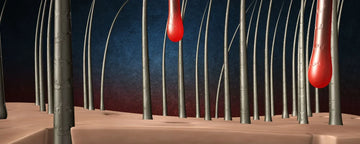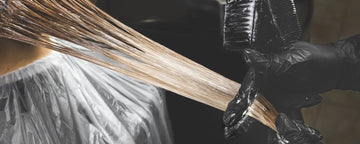
¿Qué es una mascarilla capilar?
Una mascarilla capilar es un tratamiento acondicionador profundo que proporciona una nutrición concentrada al cabello. Más intensa que los acondicionadores normales, incluye ingredientes como aceites naturales, mantecas vegetales y proteínas para tratar problemas como la sequedad y la rotura.
Las mascarillas capilares, que se utilizan una o dos veces por semana, permanecen en el cabello durante más tiempo, normalmente 10 minutos o más, para penetrar profundamente y mejorar la resistencia y suavidad del cabello. Algunas potencian el efecto con calor o un gorro de ducha.
Las diferentes mascarillas sirven para diferentes necesidades, desde la retención de humedad para los rizos hasta la protección del color. Esto las hace especialmente útiles para el cabello dañado o tratado químicamente.
Mascarilla capilar frente a acondicionador: diferencias clave
Aunque tanto las mascarillas capilares como los acondicionadores ayudan a mejorar la salud del cabello, difieren significativamente en función e intensidad. Los acondicionadores están hechos para un uso regular y ofrecen una hidratación y suavidad rápidas a nivel superficial. Ayudan a desenredar el cabello y a darle brillo, pero no reparan ni fortalecen en profundidad el tallo capilar. Las mascarillas capilares, por otro lado, están formuladas para un cuidado más intensivo. Penetran más profundamente en la estructura del cabello para aportar nutrientes concentrados que restauran la humedad, mejoran la elasticidad y reparan los daños causados por el calor, la coloración o el estrés ambiental.
El tiempo de aplicación también los diferencia: los acondicionadores actúan en solo unos minutos, mientras que las mascarillas capilares suelen requerir de 10 a 30 minutos para que surtan efecto. Además, los acondicionadores tienen una consistencia más ligera adecuada para el uso diario, mientras que las mascarillas son más espesas y nutritivas, lo que las hace ideales para tratamientos semanales o quincenales. Juntos, desempeñan funciones complementarias en una rutina de cuidado del cabello completa.
¿Cuándo se debe usar un acondicionador?
El acondicionador es esencial para el mantenimiento diario del cabello y debe usarse regularmente después del champú para mantener el cabello suave, manejable y protegido. Es especialmente importante cuando el cabello se siente seco, se enreda fácilmente o se encrespa, ya que el acondicionador ayuda a restaurar el equilibrio de la humedad y suaviza la cutícula para facilitar el desenredado y el peinado.
A diferencia de las mascarillas capilares, que ofrecen un cuidado profundo y reparador, el acondicionador proporciona hidratación a nivel superficial y forma una ligera capa protectora alrededor del tallo del cabello. Esto ayuda a reducir la fricción, mejorar el brillo y prevenir el daño causado por el cepillado, el peinado con calor o la exposición a factores ambientales como el sol y la contaminación.
El acondicionador es ideal para todo tipo de cabello y puede usarse después de cada lavado para mantener la suavidad, controlar los cabellos sueltos y preservar la salud general del cabello. Es un paso fundamental en cualquier rutina, ya que garantiza que el cabello se mantenga resistente, sin enredos y listo para peinarlo sin estrés innecesario.
¿Cuándo se debe usar una mascarilla capilar?
Las mascarillas capilares son más adecuadas cuando el cabello necesita más de lo que puede proporcionar un acondicionador normal. Si el cabello está seco, quebradizo, sobreprocesado o sin brillo, una mascarilla capilar ofrece una nutrición intensiva que penetra más profundamente en el tallo del cabello. Se recomienda especialmente después de tratamientos químicos, peinados con calor frecuentes o exposición prolongada al sol, que pueden debilitar el cabello con el tiempo.
Para aquellas personas con cabello rizado o teñido, las mascarillas proporcionan la hidratación adicional y el soporte estructural necesarios para mantener la definición, la elasticidad y la vitalidad. A diferencia de los acondicionadores, que ofrecen suavidad superficial para un mantenimiento frecuente, las mascarillas son ideales para un uso semanal o quincenal cuando el cabello muestra signos de estrés o desequilibrio.
También ayudan a calmar el cuero cabelludo irritado, a controlar el encrespamiento y a reforzar la barrera natural del cabello, lo que los convierte en un tratamiento esencial para cualquiera que desee recuperar la fuerza, la suavidad y la manejabilidad a largo plazo.
Uso de acondicionadores y mascarillas en su rutina
Para una salud óptima del cabello, ambos productos deben tener su lugar en una rutina integral de cuidado del cabello. Utiliza un acondicionador después de cada lavado para mantener la hidratación, mejorar la manejabilidad y mantener la cutícula del cabello suave y cerrada, lo que ayuda a reducir el encrespamiento y aumentar el brillo. Los acondicionadores actúan como tu primera línea de defensa contra el daño diario causado por el cepillado, el peinado con calor y los factores estresantes del medio ambiente.
Complemente esto con un tratamiento de mascarilla capilar semanal o quincenal para abordar las necesidades de acondicionamiento más profundas. Estos tratamientos intensivos actúan a un nivel más profundo dentro del tallo capilar, ayudando a reparar el daño estructural, reponer los nutrientes perdidos y proporcionar una hidratación duradera. Las mascarillas capilares son especialmente beneficiosas después de tratamientos químicos o de la exposición a condiciones climáticas adversas.
Al alternar entre acondicionadores frecuentes y tratamientos más intensivos con mascarillas capilares, te aseguras de que tu cabello reciba un cuidado constante a nivel superficial, así como una nutrición profunda ocasional. Este enfoque equilibrado crea una base sólida para un cabello más sano, brillante y resistente a largo plazo.
¿Está bien saltarse el acondicionador?
Aunque puede resultar tentador saltarse el acondicionador, sobre todo cuando se tiene poco tiempo o cuando el cabello está graso, hacerlo de forma habitual puede tener consecuencias no deseadas para la salud general del cabello. El champú está hecho para limpiar el cuero cabelludo y eliminar la suciedad y la grasa, pero también elimina parte de la humedad natural que mantiene el cabello suave y fuerte. Si no se repone esa humedad con el acondicionador, el cabello queda más vulnerable a la sequedad, el encrespamiento, los enredos y la rotura.
El acondicionador actúa suavizando la cutícula del cabello, restaurando la hidratación y creando una barrera protectora que ayuda a proteger las hebras de los factores ambientales estresantes como la exposición al sol, la contaminación y el peinado con calor. Saltarse el acondicionador de vez en cuando puede no causar un daño inmediato, especialmente en personas con cabello muy fino o naturalmente graso, pero convertirlo en un hábito puede provocar daños acumulativos con el tiempo.
Incluso si usas mascarillas capilares con regularidad, no deben considerarse un sustituto del acondicionador, ya que ambos tienen propósitos diferentes. Para una salud y apariencia óptimas del cabello, el acondicionador debe seguir siendo un elemento básico en tu rutina.
Resumen: Equilibrar el uso de acondicionadores y mascarillas capilares
Comprender las funciones y beneficios únicos de las mascarillas capilares y los acondicionadores es clave para crear una rutina eficaz de cuidado del cabello. Mientras que los acondicionadores favorecen el mantenimiento frecuente, las mascarillas capilares proporcionan el cuidado intensivo necesario para restaurar y proteger el cabello desde dentro.
Al utilizar ambos en su rutina de cuidado del cabello, podrá disfrutar de un cabello más fuerte, brillante y manejable con el tiempo.
 Entrega en 2-4 días
Entrega en 2-4 días
 Más de 100.000 clientes satisfechos
Más de 100.000 clientes satisfechos
 Garantía de satisfacción
Garantía de satisfacción












